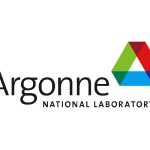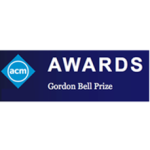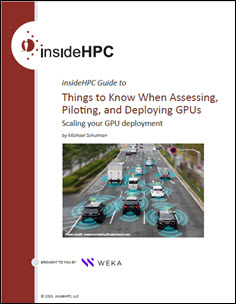In this interview conducted on behalf of HPC analyst firm Hyperion Research, we spoke with Argonne National Laboratory’s Rick Stevens about the present and future of HPC. The starting point for this conversation is a presentation Stevens gave at a Hyperion event in Washington related to implementation of the CHIPS and Science Act and includes his insights on the post-exascale build-out of an integrated network of U.S. supercomputing capacity (the Integrated Research Infrastructure, or IRI). We then look at AI for science and the use of data-driven modeling and simulation, which shows the potential to deliver major performance gains for researchers….
Intel Alters HPC-AI Roadmap: ‘Rialto Bridge’ GPU Discontinued
After business hours on Friday, Intel released information on a “streamlined and simplified” data center GPU roadmap with direct impact on HPC and AI. The new plan calls for the discontinuation of the “Rialto Bridge” GPU, which was to have succeeded the Ponte Vecchio chip that itself was delayed several years before shipments began last […]
Let’s Talk Exascale: ALCF’s Katherine Riley Talks Aurora Deployment, Impactful Science and Partnering with ECP
In this episode of the “Let’s Talk Exascale” podcast, the Exascale Computing Project’s (ECP) Scott Gibson talks with Katherine Riley, director of science at the Argonne Leadership Computing Facility. Her mission is to lead a team of ALCF computational science experts who work with facility users to maximize their use of the facility’s computing resources. […]
Argonne: ATPESC 2023 Applications Due March 1
Jan. 4, 2023 — Applications are due Wednesday, March 1 for the annual Argonne Training Program on Extreme-Scale Computing (ATPESC), which will take place July 30-August 11, 2023 in the Chicago area. Apply here. There are no fees to participate in ATPESC. Domestic airfare, meals and lodging are also provided. The program offers the opportunity […]
@HPCpodcast Special Edition: 2022 in Review and What’s Ahead in 2023 for HPC
In this year-in-review double-issue episode of @HPCpodcast, Shahin and Doug continue what is becoming a tradition, a discussion of some of the notable developments, trends and news stories of the past year in HPC, including : HPC market growth, the U.S.-China supercomputing competition and trade war, the official arrival of exascale-class supercomputing, quantum computing, SC22, artificial intelligence (including “sentient AI”) and machine learning, Jack Dongarra’s ACM Turing Award, the criticality of emerging interconnect technologies, the defunct Nvidia-Arm deal, the CHIPS & Science Act and the push for domestic chip production in the U.S., HPC software and fusion energy.
EuroHPC and Forschungszentrum Jülich in Hosting Agreement for Exascale Supercomputer JUPITER
Jülich / Luxembourg, 14 December 2022 – A hosting agreement has been signed between the European High Performance Computing Joint Undertaking (EuroHPC JU) and the Jülich Supercomputing Centre (JSC) where JUPITER, the first European exascale supercomputer will be located (see earlier JUPITER coverage). JUPITER has been designed to support the development of high-precision models of […]
Scientists Using Frontier Supercomputer Win 2022 Gordon Bell Prize, Another Frontier Team Named Prize Finalist
[SPONSORED CONTENT] How many researchers can say they’ve not only run their scientific job on the AMD-powered Frontier supercomputer, the world’s no. 1 ranked HPC system and the first exascale-class machine, but also on Fugaku, Summit and Perlmutter, the world’s second-, fifh- and eighth-ranked HPC systems in the world, respectively? But that’s the case with an interntional group of researchers working on particle-in-cell simulations who have developed code that won….
At SC22: ACM Gordon Bell Prize Awarded for Particle-In-Cell Simulations on Frontier, Fugaku, Summit and Perlmutter Supercomputers
New York, NY, November 17, 2022 – ACM, the Association for Computing Machinery, named a 16-member team drawn from French, Japanese, and US institutions as recipient of the 2022 ACM Gordon Bell Prize for their project, “Pushing the Frontier in the Design of Laser-Based Electron Accelerators With Groundbreaking Mesh-Refined Particle-In-Cell Simulations on Exascale-Class Supercomputers.” The members of […]
@HPCpodcast at SC22: An Analysis of the New TOP500 List
This special SC22 edition looks at the new TOP500 list of the world’s most powerful supercomputers, released today. It marks the 60th edition of the list, repesenting 30 years of systematic data on the highest performing computer architecture and configurations. While this TOP500 is not full of surprises, there’s a new no. 1 at the top of the GREEN500, and across all the categories of the list there’s always important historical data and valuable tea leaves pointing to future trends….













